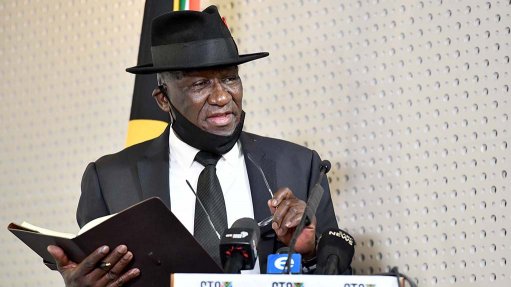
BHEKI CELE The Police Minister has been a strong proponent of alcohol bans whenever possible
Photo by: Creamer Media
Last month, after Police Minister Bheki Cele announced that the government would like to ban alcohol sales on November 1 – the date of the municipal elections – the Beer Association of South Africa (Basa) voiced concern over the risk that government would once again enforce arbitrary alcohol restrictions when the expected fourth wave of Covid-19 infections hits in December.
Basa CEO Patricia Pillay said in a statement issued last month that the previous four alcohol bans saw the beer industry losing 161 days of trade since March 2020, putting more than 240 000 jobs at risk, with a tax revenue loss of R34.2-billion and R10.2-billion lost in excise revenue.
“No government funding or relief has been provided to assist our sector throughout this crisis, which has resulted in many small businesses being forced to close their doors permanently, including 27 craft breweries. South Africa currently has the highest unemployment rate globally – any further job losses within the alcohol industry will have a devastating impact on our economy,” she said.
The beer industry has repeatedly requested that government provide the scientific data and evidence on which they have based their decision to enforce the previous alcohol bans. When South Africa was moved to Alert Level 2 on September 21, bottle stores were allowed to operate for an extra day on Fridays.
“Unsurprisingly, this was not what government’s scientific advisers had recommended. In fact, a memo from the Ministerial Advisory Committee indicated that any attempts to keep in place the ban on alcohol sales for offsite consumption on Saturdays was ‘difficult to justify’. This proves that government’s restrictions on alcohol have not been the result of an evidence-based approach,” Pillay said.
She says this is not the first time that government has used the alcohol industry as a scapegoat. A memo published by the Department of Health on December 23, 2020, recommended a Level 2 lockdown, a curfew and restrictions on gatherings but did not make any mention of a ban on liquor sales.
Regardless of this recommendation, a ban on the sale of alcohol was arbitrarily instituted from December 28 to February 1.
“This had devastating consequences on our local craft brewing sector, which is still struggling to recover from the loss of income as a result of the first two alcohol bans,” Pillay said.
Given such arbitrary decision-making, Basa fears that the local beer industry could once again suffer the consequences of government restrictions in the lead-up to summer. This concern was reinforced by Cele announcing that alcohol sales would be banned on municipal election day, with no reason given for government’s decision or any consultation with the industry having taken place.
“Basa continues to call for proper consultation by government before considering any new regulations to stop the spread of Covid-19 over the coming months. Our industry and the over 450 000 livelihoods it supports can simply not afford the President announcing another sudden ban on the legal trade of alcohol without any prior warning or an opportunity to properly engage with government,” Pillay said.
She said that Basa firmly believes that, Trade, Industry and Competition Minister Ebrahim Patel should listen to the beer industry’s plight and take up its concerns in order to help save a sector that is a significant contributor to the economy and job creation.